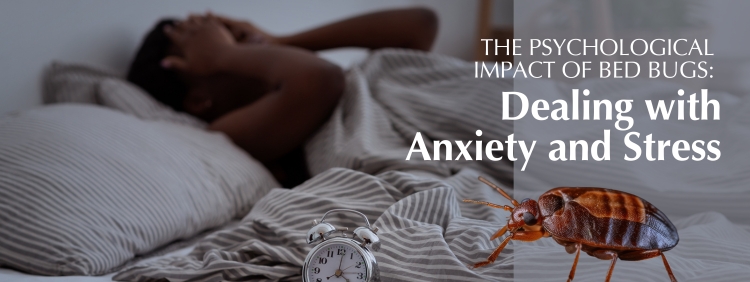 Just the mere thought of bed bugs can make you want to search Google for "bed bug control near me." These tiny, blood-sucking parasites have a knack for making their presence felt in the most discomforting ways. While the physical effects of bed bugs, like itchy and red welts, are widely known and discussed, the psychological impacts are often overlooked. Yet, living with an infestation can significantly impact your mental well-being, leading to anxiety, stress, and even insomnia.
In this insightful blog, we shall take a deep dive into understanding the psychological impact and provide you with practical tips to know when to call a bed bug exterminator at home.
Just the mere thought of bed bugs can make you want to search Google for "bed bug control near me." These tiny, blood-sucking parasites have a knack for making their presence felt in the most discomforting ways. While the physical effects of bed bugs, like itchy and red welts, are widely known and discussed, the psychological impacts are often overlooked. Yet, living with an infestation can significantly impact your mental well-being, leading to anxiety, stress, and even insomnia.
In this insightful blog, we shall take a deep dive into understanding the psychological impact and provide you with practical tips to know when to call a bed bug exterminator at home.
A Nightmare Under The Sheets
Imagine finding yourself in a situation where the cringe at the sight of a bug is replaced by a fear that exceeds the occasional irritant or annoyance. You're not just sharing your home with a creature that you'd usually usher outdoors or squash without a second thought, but an incessant, nightmarish problem that feeds on your blood when you're at your most vulnerable and leaves you itching, sleepless and anxious. That's the reality for those dealing with a bed bug infestation - a terrifying violation of your personal sanctuary, your peaceful sleep, and above all, your sense of safety and well-being. Bed bugs don't spread diseases or pose a physical danger beyond the annoyance of their bites, so it's easy to underestimate the toll they can take on your mental health. But don't be fooled; the psychological impact they impose is real and not to be discounted. Anxiety, depression, and paranoia are common responses to an infestation and can persist long after the pests themselves have been eradicated from your abode.The Silent Mental Trauma of Bed Bug Infestations
What makes it worse is the silence surrounding this aspect of bed bug infestations. The focus is primarily on eradicating the bugs and treating the physical symptoms. The mental health consequences, even while evident, often go unaddressed. You may not even realize that the persistent stress is a product of your battle against the bugs. This silent trauma can chip away at your peace, unnoticed until it's caused substantial worry. Uncontrollable situations such as bed bug infestations could be especially tough on individuals already coping with anxiety and stress disorders. The constant worry about the bugs' return, the discomfort caused by itchy bites, and the impact on personal and social life can all significantly worsen these conditions. Feeling a loss of control is another common reaction to infestations. Bed bugs are notoriously difficult to eliminate completely. And when the infestation persists despite your best efforts, feelings of powerlessness can set in. This loss of control, and the fear and anxiety associated with it, can lead to chronic stress.Moving Forward: Acknowledging the Mental Impact
Moving forward, it becomes pertinent to consider the psychological impact while dealing with bed bugs. The vexation, anxiety, and sleepless nights are not just about bugs. They're about mental well-being. And just like with physical health, proactive steps are essential to prevent any serious mental health issues. So, the next time you spot warning signs of an infestation, act swiftly. Not just to safeguard your homes, but also your minds.Breaking the Cycle: How to Regain Control and Overcome Bed Bug-Related Anxiety
Regaining authority and overcoming anxiety associated with bed bugs begin with knowledge and proactive steps. Equip yourself with the right information. Learn about these pests, their lifecycle, their habits, and measures to eradicate them. Familiarizing yourself with the enemy in this battle can reduce the fear factor and give you a sense of control over the situation. Let's break this down into actionable steps:Step One: Understanding Your Foe
Admittedly, bed bugs might seem like the stuff of nightmares when you start researching them. But bear in mind, the aim here is not to fuel your worry but to educate yourself for battle. Understanding their habits, behaviours, and life cycles can give you the upper hand. Nuances such as the fact that they cannot fly or jump, and only move around by crawling, can prove to be key knowledge in effectively fortifying your defenses.Step Two: Implementing Preventive Measures
Once you are well-armed with information, your next line of action is proactive defence. Simple preventive measures like regular cleaning and vacuuming, sealing cracks and crevices in your home, and reducing clutter can drastically lower the chances of an infestation - or a return if you've already had one.Step Three: Seeking Professional Help
 If you're already dealing with an infestation, remember this: It's not a mark against your housekeeping skills or cleanliness. Bed bugs are hitchhikers - they can travel from place to place through luggage, furniture, and clothing. It's essential to seek professional help from Truly Nolen at this stage, as DIY solutions are often ineffective and can unintentionally spread the infestation.
If you're already dealing with an infestation, remember this: It's not a mark against your housekeeping skills or cleanliness. Bed bugs are hitchhikers - they can travel from place to place through luggage, furniture, and clothing. It's essential to seek professional help from Truly Nolen at this stage, as DIY solutions are often ineffective and can unintentionally spread the infestation.

